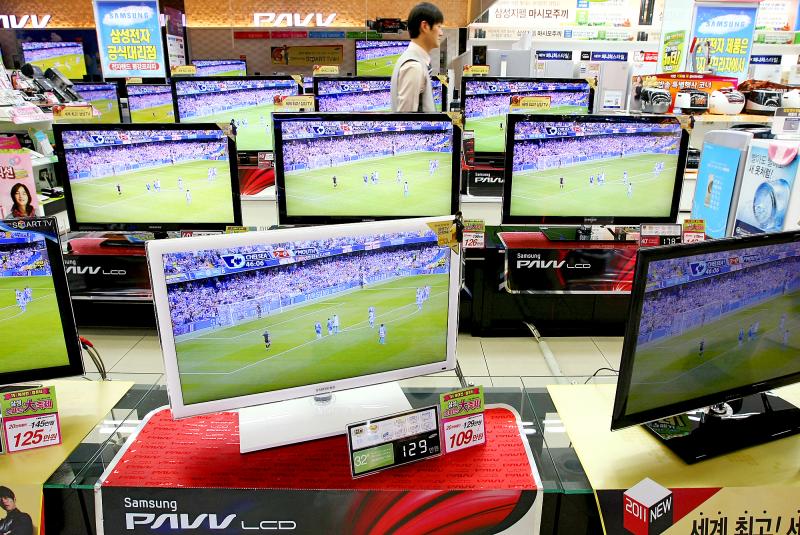Samsung Display Co’s plans to continue manufacturing LCD panels in South Korea are not expected to affect market dynamics in the first half of this year, but might exacerbate a supply glut during the second half, market researcher TrendForce Corp (集邦科技) said in a note on Thursday.
The display unit of Samsung Electronics Co last week said that it would extend its production of panels for TVs and monitors due to COVID-19-driven demand, reversing its announcement in March last year that it would end all production by the end of the year to pursue a technology upgrade.
“Despite previous expectations [that it would] shutter its LCD panel manufacturing operations, Samsung Display will continue manufacturing panels in South Korea, with one 7-generation and two 8.5-generation production lines operating throughout the first quarter of 2021,” TrendForce said.

Photo: Bloomberg
“However, in consideration of costs, technological transition schedules and client demand for specific panel sizes, Samsung Display is expected to retain manufacturing operations at only one 8.5-generation production line in the fourth quarter of 2021,” the Taipei-based research firm said, adding that Samsung Display’s continued panel manufacturing is expected to conclude by the end of this year.
Given persisting component shortages, coupled with steady demand for display panels used in TVs, monitors and laptops, overall LCD panel supply and demand is predicted to mostly remain balanced until the end of the first half, despite Samsung Display’s plan to extend LCD manufacturing, TrendForce said.
However, the research firm did not rule out the possibility of a supply glut in the second half, even though Samsung Display has pledged to sell all of its panels to Samsung Electronics, which has historically been the largest purchaser of display panels, it said.
“The increased panel supply from Samsung Display certainly represents a potential risk that may disrupt the panel industry’s supply and demand equilibrium,” TrendForce said. “Whether Samsung Electronics will shift its panel purchasing strategies in response [to the supply of panels from Samsung Display] will remain an important point of observation for the panel market in 2021.”
In related news, NH Investment & Securities Co expects LCD panel prices, which were high at the end of last year, to continue rising in the first quarter due to an anticipated decrease in glass substrate supply.
That is because Japan-based glass substrate maker Nippon Electric Glass Co (NEG) had a power outage for five hours in its Takatsuki plant in Japan on Dec. 10, the Seoul-based securities firm said in a note on Wednesday.
As the incident damaged five glass furnaces at the Takatsuki plant and might affect NEG’s shipments for about a quarter, NH Investment said that South Korean panel makers and their Taiwanese peers could find it hard to source glass substrate in the short term, which would maintain panel prices into the first quarter.
LCD panel prices would likely remain flat in the second quarter compared with the first quarter due to an acceleration in panel production alongside normalized supply of glass substrates, the securities firm said.
However, panel prices are forecast to decline from the third quarter, as supply should exceed demand due to ongoing production expansion by Chinese manufacturers, centering on facilities that are eighth generation and above, NH Investment said.

South Korea’s equity benchmark yesterday crossed a new milestone just a month after surpassing the once-unthinkable 5,000 mark as surging global memory demand powers the country’s biggest chipmakers. The KOSPI advanced as much as 2.6 percent to a record 6,123, with Samsung Electronics Co and SK Hynix Inc each gaining more than 2 percent. With the benchmark now up 45 percent this year, South Korea’s stock market capitalization has also moved past France’s, following last month’s overtaking of Germany’s. Long overlooked by foreign funds, despite being undervalued, South Korean stocks have now emerged as clear winners in the global market. The so-called “artificial intelligence

‘SEISMIC SHIFT’: The researcher forecast there would be about 1.1 billion mobile shipments this year, down from 1.26 billion the prior year and erasing years of gains The global smartphone market is expected to contract 12.9 percent this year due to the unprecedented memorychip shortage, marking “a crisis like no other,” researcher International Data Corp (IDC) said. The new forecast, a dramatic revision down from earlier estimates, gives the latest accounting of the ongoing memory crunch that is affecting every corner of the electronics industry. The demand for advanced memory to power artificial intelligence (AI) tasks has drained global supply until well into next year and jeopardizes the business model of many smartphone makers. IDC forecast about 1.1 billion mobile shipments this year, down from 1.26 billion the prior

People stand in a Pokemon store in Tokyo on Thursday. One of the world highest-grossing franchises is celebrated its 30th anniversary yesterday.

Chinese artificial intelligence (AI) start-up DeepSeek’s (深度求索) latest AI model, set to be released as soon as next week, was trained on Nvidia Corp’s most advanced AI chip, the Blackwell, a senior official of US President Donald Trump’s administration said on Monday, in what could represent a violation of US export controls. The US believes DeepSeek will remove the technical indicators that might reveal its use of American AI chips, the official said, adding that the Blackwells are likely clustered at its data center in Inner Mongolia, an autonomous region of China. The person declined to say how the US government received